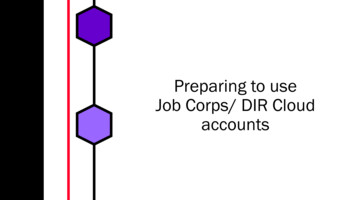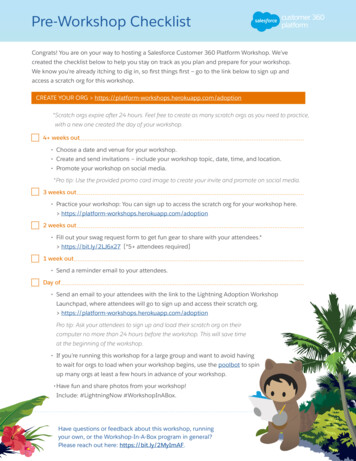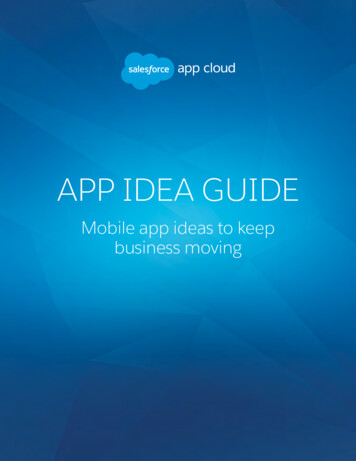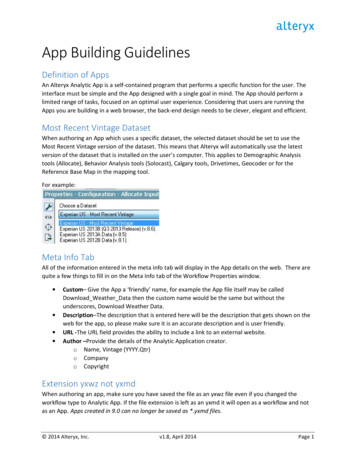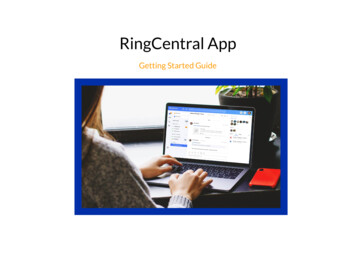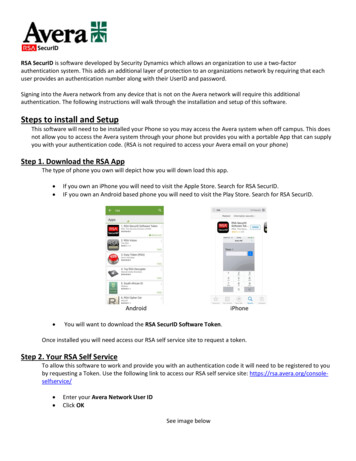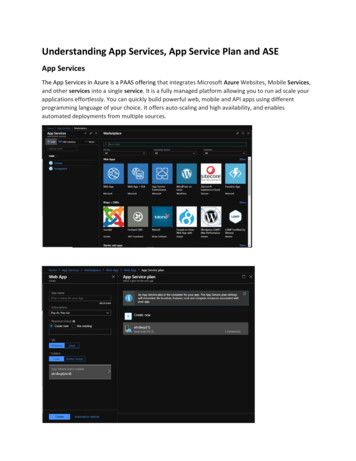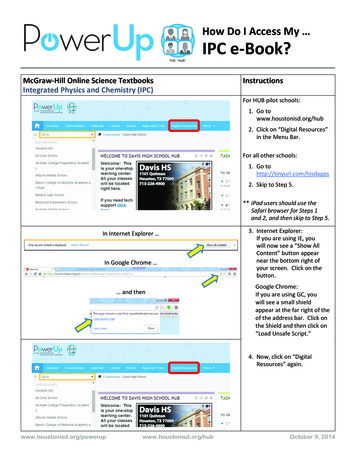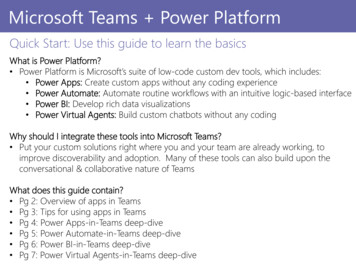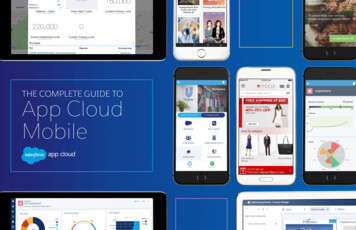
Transcription
THE COMPLETE GUIDE TOApp CloudMobile
1INTRODUCTION2TableofContentsTHE MOBILE OPPORTUNITY3MODERN APP DEVELOPMENT USING APP CLOUD MOBILE06 Breaking It Down: Mobile UX07 Breaking It Down: Mobile Back-end Services4PUTTING IT ALL TOGETHER WITH APP CLOUD MOBILE10 Salesforce1 Mobile App: Integrated, Instant Deployment12 Custom Apps with Mobile SDK: Branded Stand-Alone Apps14 Custom Mobile Apps with Heroku: Language and Back-endFlexibility with Support for Microservices5NEXT STEPS6REFERENCE DIAGRAMS19 Salesforce1 Mobile App20 Custom Apps with Mobile SDK21 Custom Mobile Apps with Heroku
INTRODUCTION1Customer mobility isbecoming key to transformingcustomer relationshipsand creating new revenue streams through“in the moment” customer experiences.Enterprise mobility is critical for businessagility, and there is a big push to giveemployees the same digital tools thatcompanies are giving to customers.By 2020, 75% ofapplication purchasessupporting digital businesswill be ‘build,’ not ‘buy’.” 1— GARTNER1Forecast Analysis: Enterprise Application Software, Worldwide, 1Q16 Update. Gartner, 10 May 2016Where will these mobile apps come from? Increasingly, enterprises areunder pressure to build a strong in-house mobile competency. Accordingto Gartner, “By 2020, 75% of application purchases supporting digitalbusiness will be ‘build,’ not ‘buy’.” That’s created a demand to makemobile development easier, faster, and more accessible to developersand nondevelopers within the enterprise.However, the current approach to mobile app development is simply notscalable. Building apps for contextual mobile experiences that leveragedata — both in network and offline — while addressing security andscalability requires a lot of time and resources.Other hurdles include:A lack of skilled developers is slowing mobile transformationand forcing companies to prioritize and deliver only a fewapps at a time.Conventional monolithic back-end platforms can’t keepup with the rapid deployments mandated by agile-centricmobile development.The explosion in mobile tools, frameworks, and approacheshas further increased the governance burden for IT leaderson their way to accelerating mobile innovation.This document is designed to help you quickly understand the technicalmobile landscape, to learn how App Cloud Mobile provides enterprise-classmobile app development capabilities for balancing speed and control, andto provide you with development guidance for your mobile journey.3
THE MOBILE OPPORTUNITY2The MobileOpportunityWe see three major opportunities in the rapidlychanging world of mobile:123Harness systems of record (including functional areas likesales, service and ERP, as well as custom business apps) andmake that data actionable in mobile apps on any platformor device.Finally get ahead of the IT mobile backlog by decreasingboth delivery time and your portfolio’s risk profile andgovernance burden.Activate all developer types, from business analyststo professional developers, who want to use emergingframeworks, open source tools, and new programmingmodels (including microservices) to deliver more apps, faster.Today’s IT leaders and mobiledevelopers have a huge numberof choices (and decisions) whenselecting their go-forward strategyand tool set. No single-enterprisesoftware provider addresses allpossible use cases.App Cloud Mobile focuses on fourmain areas:1Strong low-code capabilities forrapid apps2Direct support for current and emergingJavaScript mobile frameworks and acomplete SDK3The industry’s leading elastic computeenvironment, Heroku, as the foundation formassive-scale consumer apps4Streamlined integration, through data-byreference, APIs, and third-party ecosystemsThese areas can be thought of as a mobilecontinuum of capabilities for this type of appdevelopment. App Cloud Mobile gives everycompany the ability to leverage these tools toquickly and easily build, deploy, and manageany type of responsive mobile app and exploitmobile opportunities.4
MODERN APP DEVELOPMENT USING APP CLOUD MOBILE3Modern AppDevelopmentUsingApp CloudMobileMobile app components are composed of auser experience (UX) and a series of mobileback-end capabilities. In this section, we willlay out the components that make up each,and then explore how App Cloud Mobileeffectively supports and connects thesecomponents into working apps.5
MODERN APP DEVELOPMENT USING APP CLOUD MOBILE3Breaking It Down: Mobile UXWhile there are many types of mobile apps, Salesforce has found they can be summarized in the following table. These are the commonly used ways to approachbuilding the user-facing portion of mobile apps, along with their important trade-offs.APP ndCustomersMOBILE UXSalesforce1Mobile App (S1)FEATURESDrag-and-drop app creationNear-instant app distributionSingle container for all S1 appsSelf-contained, reusable applicationcomponents (Lightning components)DEVELOPERSKILL SETS NEEDEDUX CUSTOMIZATIONCAPABILITIESDEPLOYMENT METHODBusiness Analysisand Configuration(No Coding SkillsRequired)Standard: Based on Lightningcomponents, brandingthrough page logos and colorsAdmins deploy;apps automaticallyappear for allauthorized users inthe S1 containerHybrid: WebDevelopment ToolSpecific JavaScriptHybrid: Custom UX withadvanced graphical anddevice-specific capabilitiesVia internal/external appstores or websitesNative: Device-SpecificLanguages, JavaScriptNative: Advanced UX withunlimited interactivity and useof device-specific featuresHybrid: WebDevelopment ToolSpecific JavaScriptHybrid: Custom UX withadvanced graphical anddevice-specific capabilitiesNative: Device-SpecificLanguages, JavaScriptNative: Advanced UX withunlimited interactivity and useof device-specific featuresNo-code access to device cameraand microphoneApps are responsive OOTBOffline support for recently usedrecords and draft record Hybrid/Native with SalesforceMobile SDKMultiple choices of HTML5/JavaScript frameworks2Advanced features including touchoptimization, components, sampleapps, choice of IDESalesforce Mobile SDK3 providesfull support for offline and secure/encrypted local storageIncreased branding flexibilitySupport for component-basedLightning Design System d/NativeMultiple choices of HTML5/JavaScript frameworksAdvanced features including touchoptimization, components, sampleapps, choice of IDEIncreased graphical capabilityDevice-dependent language/framework supportSupport for component-basedLightning Design System (LDS)62See obile-packs3See https://developer.salesforce.com/page/Mobile SDK4See http://www.lightningdesignsystem.comVia internal/external appstores or websites
MODERN APP DEVELOPMENT USING APP CLOUD MOBILE3Breaking It Down:Back-End ServicesThe most valuable mobile apps are the ones that providebusiness or user context – that is, the ones that includefunctionality that reads and updates relevant data, use dataMOBILE BACK-END FEATURESecure,TrustedPlatformfrom disparate sources, and leverage services from othercloud and on-premises-based apps. Developers need to easilyAPP CLOUD MOBILE DESCRIPTIONApp Cloud’s S1 approach directly leverages Salesforce’s global, secure, multitenantservices, and supports a rich sharing model and user management.When using App Cloud’s Heroku service, developers can leverage Private Spaces5, aVirtual Private Cloud (VPC) with the capability to meet additional security needs andenable microservices-based programming models for independent development teams.Both S1-and SDK-based approaches can take advantage of encrypted offline dataprotects any in-flight data and prevents unauthorized access if the mobile device is lostor stolen.tap into an enterprise-grade set of mobile back-end servicesto ensure that their apps have this complete business or usercontext and, meet the requirements at hand. App CloudMobile provides a full set of capabilities that expose andExtensibilityApp Cloud’s metadata foundation and focus on component-based developmentmeans that developers can quickly develop and deploy apps, as well as add featureimprovements and rapidly iterate to decrease time to market, all while reducingapp backlogs.Basic MobileBack-EndServicesPush Notifications; full support through native OS vendors including Apple,Google, and Microsoft (for S1- and SDK-based apps)extend business data.Social Capabilities; access the Chatter REST API as well as Salesforce CommunityCloud (for SDK-based apps)Geolocation Services: through native device capability (for SDK-based apps)File Access: asynchronous upload/download support (for S1- and SDK-based apps)Mobile Identity: OAuth capability with optional PIN authentication (for S1- andSDK-based apps)Integration:APIs andConnectorsApp Cloud supports complete REST, SOAP, and streaming APIs that mobiledevelopers can use to create any type of composite appSalesforce Connect provides data-by-reference via the industry-standardOData protocolAppExchange ISV and SI partner communities bring additional capabilities viacustom connectorsMobile DeviceManagement(MDM) SupportApp Cloud Mobile provides OOTB support for all major MDM solutions, includingpolicy support, custom login URLs for apps, and certificate-based authentication.This requires no changes to the application code (for SDK-based apps). S1 providescomplete MDM support for Android and Windows.75See https://www.heroku.com/private-spaces for further details.
PUTTING IT ALL TOGETHER WITH APP CLOUD MOBILE4Putting It AllTogether withApp CloudMobileAs IT leaders, you need to weigh thepros and cons of mobile developmentapproaches against your specific use cases.Additionally, you need to address the needsof stakeholders and customer segments. Inthe following table, we combine the mobileUX and mobile back-end componentsintroduced earlier to present three keymobile solution approaches.8
PUTTING IT ALL TOGETHER WITH APP CLOUD MOBILE4As discussed earlier, while these suggested application types are the most common, Salesforce has also seen customers create anumber of variations to meet their particular requirements, budgets, and skill sets.SOLUTION APPROACHSalesforce1Mobile App:Integrated,InstantDeploymentMobile SDK:Branded,Stand-AloneAppsMobile Appswith Heroku:Custom,MultiLanguage,Elastic9WHAT KINDS OF APPS CAN I BUILD?HOW DO I DEVELOP?WHAT ADDITIONAL APP CLOUDFEATURES SHOULD I CONSIDER?Business Apps for Automating ProcessesApprovalsCase ResolutionOrder TrackingStreamlining Sales Management InventoryManagementSimple Site SurveysTime and Expense Tracking Internal Event Mgmt.Contract ManagementConcierge AppsMobile Client:Salesforce1 Mobile App ContainerAppExchange LightningComponentsDevelopment Tools:Lightning App Builder, Lightning ProcessBuilder, Lightning ComponentsSalesforce Community CloudEnterprise Apps for Mobilizing ComplexProcessesMobile Client:Web, Cross-Platform Hybrid, or NativeAppExchange LightningComponentsDevelopment Tools:Lightning Components or JavaScriptFramework, Salesforce Mobile SDKSalesforce Community CloudSpecialized Field ServiceE-detailingHigh-Touch Financial ManagementField Asset ManagementComplex Site SurveysBranded Event ManagementRealty ManagementInsurance Claim SubmissionCustomer and Consumer Apps for Creating1-to-1 ExperiencesSpecialized Field ServiceB2C Loyalty AppsE-commerceProperty ManagementIoT Field ServiceSocial Media/CommunitySharing Economy AppsB2C Wellness/FitnessRecommendation AppsBack-End:Salesforce Core OOTBBack-End:Salesforce Core via API and MobileBack-End ServicesMobile Client:Web, Cross-Platform Container, or NativeDevelopment Tools:Lightning Components or JavaScriptFrameworkSalesforce ConnectSalesforce ShieldSalesforce ConnectSalesforce ShieldAppExchange LightningComponentsSalesforce Community CloudSalesforce ConnectSalesforce ShieldBack-End:Heroku PaaS via API and MobileBack-End ServicesEach of the approaches is further described in the following sections. Please also see “Reference Diagrams” at the end of this document for visual representations of each solution approach.
SALESFORCE1 MOBILE APP: INTEGRATED, INSTANT DEPLOYMENTPUTTING IT ALL TOGETHER WITH APP CLOUD MOBILE4Salesforce1 Mobile App-based apps are focused on increasing the day-to-day productivity of employees. In this approach, the Salesforce1 Mobile Appcontainer is used to host custom low-code mobile apps built by admins or business analysts.The S1 mobile container offers these key features:Ability to quickly build apps with no code and no deployment effort (activated apps are visible instantly on Salesforce1 Mobile App)Direct camera access (for posting photos back to apps)Voice-to-text input (for text form fills)Offline access (when offline, locally stores updates and synchronizes when device is connected)Connects to Salesforce data through REST APIsSalesforce Connect for real-time access to external data sourcesDevelopers often use this approach to extend Sales Cloud and Service Cloud functionality, and build analytics reports anddashboards for mobile users. In addition, other features of App Cloud can be used by the Salesforce1 Mobile App, including:WorkflowAlertsChatterThird-party AppExchange Lightning ComponentsIntegration to back-end systems through Salesforce Connect or ApexAuthorized access to data encrypted through Salesforce ShieldCommon use cases for this approach include:Approval requestsCase resolutionTrouble tickets managementOrder fulfillment (including accessing datafrom ERP and other systems)CRM tasksSales-based streamlined customer data capture;any geolocation appsInventory managementCustomer service: customized site surveys anddigital signature appsSimple site surveys10HR apps:Company calendar/holidaysEventsFitness scheduleBuilding/parking infoCafeteria menus
SALESFORCE1 MOBILE APP: CUSTOMER STORYPUTTING IT ALL TOGETHER WITH APP CLOUD MOBILE4Unilever delivers sixapps in six months tothousands of employeeswith App Cloud Mobile.MyApprovals app streamlines submissions ofmillions of approvals and gives time back tothousands of employees each day.FEATURED APPMyApprovals (mobile approvals)WHAT THE APP DOESMyApprovals brings together approval workflows from a number of ERPsystems to reduce the effort in approving purchase orders, expenses,invoices, and more. By reducing approval submission from 2 minutes to10 seconds across 2 million approvals processed annually, the app has theApp Cloud Mobile is akey part of our visionfor a digital employee.It is our strategicplatform for deliveringmobile apps to a staffof 100,000 globally.”TOM MADDEN APPS LEADpotential to save thousands of employee hours per year.HOW THE APP WORKSOnce the approval notification pops on the employee’s mobile device, theemployee uses single sign-on to log in to the app and clicks to approve orreturn the request. The app syncs with multiple business systems and sortsdifferent approvals in one list view for a one-stop approval experience.WHO BUILT THE APPA tech lead with a co-located DevOps team, partnering with Mindtree, builtthe front end of the app in under 8 weeks.UNDERLYING ARCHITECTUREUX: Cross-platform Salesforce1 Mobile App with custom Visualforce page;S1 offline capability; MuleSoft as an integration layer; platform services foridentity and single sign-on. The app works in 33 languages. The Unileverteam is in the process of rebuilding it on Lightning.OTHER APPS BUILT WITH APP CLOUD MOBILE11Agent App, Ideas App, Workplace App, Everyday Action App, News App
MOBILE SDK: BRANDED, STAND-ALONE APPSPUTTING IT ALL TOGETHER WITH APP CLOUD MOBILE4Apps built using the Mobile SDK are focused on providing a highly customized and branded user experience. Typically, such apps focus on enablingincreased customer engagement and retention, managing complex supply chains and partner ecosystems for increased service, and the seamlessexecution of transactions. In this approach, developers create stand-alone mobile apps using a number of widely used JavaScript and componentframeworks,6 and leverage the Salesforce Lightning Design System7 in conjunction with their chosen tool set. They also use the Salesforce Mobile SDK andRESTful services to access Salesforce as mobile back-end as a service.Key benefits include:Developer choice of component framework, including Angular, Polymer, React, Xamarin, and othersHigh control over branding and user experienceOOTB access to the Salesforce sharing, security, and federated identity models via standard REST and OAuth mechanismsSupport for all major MDM productsEnterprises can choose to expose Partner Communities via the REST APICommon use cases for the SDK approach include:Large-scale supplier communities: knowledge sharing, RMA managementSupply chain managementDistributor networks: supply chain management, lead pass, deal management, and more.Healthcare and life sciences: e-detailingSpecialized CRMSpecialized field of serviceBranded event management126See obile-packs7See http://www.lightningdesignsystem.com/
MOBILE SDK: CUSTOMER STORYPUTTING IT ALL TOGETHER WITH APP CLOUD MOBILE41,000 Barclays RelationshipDirectors now run theirbusiness from their iPad.Barclays uses App Cloud Mobile SDK to enable1,000 Relationship Directors to productively runtheir business from their tablet with a native iOS app.FEATURED APPMyClient App (relationship management)WHAT THE APP DOESThe myClient iOS app prepares Relationship Directors with real-timeknowledge of the client account, past conversations, potential talking points,products they hold, account balances, as well as the kind of income generatedby the client — before they walk into the meeting. Additionally, RelationshipDirectors can take meeting notes and submit in real time without needing toprepare lengthy reports days, and sometimes weeks after.HOW THE APP WORKSRelationship Directors download the app from the internal corporate app storeand login using their credentials. The app calls a series of custom REST APIsand syncs all the relevant data in CRM to their iPads using offline cachingfunctionality; relationship directors can view and edit client records in real time.WHO BUILT THE APPApp Cloud Mobile gives us the power todeliver custom mobile apps in just a coupleof months, so we can focus on making theentire business more productive”CARL CARTER VP, CRM13One native developer, one Salesforce developer and a couple of businessanalysts launched the initial version in under 3 months with focused bi-weeklyreleases; continual updates have been released on a monthly basis ever since.UNDERLYING ARCHITECTUREUX: Native iOS and Third-Party Graphing Libraries; Mobile SDK Services;Offline, REST APIs for connecting to data; Custom SSL Pinning and ComplexPin; Platform ServicesOTHER APPS BUILT WITH APP CLOUD MOBILEMortgage Application App, Digital Marketing App
CUSTOM MOBILE APPS WITH HEROKU: CUSTOM, MULTI-LANGUAGE, ELASTICPUTTING IT ALL TOGETHER WITH APP CLOUD MOBILE4In many cases, mobile app developers need to provide a highly effective user experience and seamless extension of the enterprise’s brand for verylarge audiences. Also, as more development teams adopt the microservices approach to app development, they need additional flexibility in backend tooling and the ability to independently deploy apps across a heterogenous set of back-end services.In the Mobile SDK and Heroku approach, developers can write either hybrid or native apps to meet their customers’ requirements and use AppCloud’s Heroku service as a scalable “elastic” compute capability that can easily scale to meet any demand. To construct their end-to-end apps,developers use a combination of APIs and their server-side language of choice to build responsive mobile apps coupled with Heroku computer powerand flexible data stores.Key benefits of this approach include:Developer choice of component framework, including Angular, Polymer, React, Xamarin, as well as server-side developmentlanguages (Ruby, Java, Scala, Node.js, and others)High control over branding and user experienceSupport for microservices-based development models, including Continuous Integration/Continuous Delivery via Heroku FlowRich set of functional back-end add-ons (logging, messaging, data services, and more) available to development teamsOut-of-the-box (OOTB) federated identity across Force.com and Heroku via standard REST and OAuth/SAML mechanismsSupport for all major MDM frameworksBack-end compute scale and elasticity with none of the provisioning or complex configurations to manageDepending on specific requirements for business data and integration, developers can leverage a number ofadditional App Cloud capabilities and tools, including:Seamless bidirectional sync between Heroku data stores and sales/service business data (via Heroku Connect)Ultra-secure Virtual Private Cloud (VPC) connectivity between on-premises enterprise apps and dedicatedHeroku instance (Heroku Private Spaces)Full REST APIs to quickly provide mobile apps with the business data they needVast ecosystem of connectors, ISV/SI partners, and marketplace to streamline integration and deploymentCommon use cases for the Heroku approach include:Business-to-consumer loyalty programsBusiness-to-customer custom intranet14Business-to-business complex business rule-based computations
CUSTOM MOBILE APPS WITH HEROKU: CUSTOMER STORYPUTTING IT ALL TOGETHER WITH APP CLOUD MOBILE4ILLUMINATE brightensthe future of monumentalBay Area public art.ILLUMINATE uses App Cloud to establish adonor system of record, as well as a donorengagement app running on Heroku tosupport its “Shine It Forward” program.FEATURED APPShine It ForwardWHAT THE APP DOESApp Cloud Mobile fromSalesforce has enabledus to build a robustdonor engagementsystem that we canuse to create ongoingrelationships — anextremely valuable assetfor an arts organization.”BEN DAVIS FOUNDER AND CHIEF VISIONARY OFFICEThe Shine It Forward app is a mobile-first, responsive web app that performsgracefully across mobile, tablet, and desktop browsers. Donors can dedicate alight in The Bay Lights project to a loved one and memorialize the dedicationby uploading a photo and text. The system randomly assigns a light from theavailable pool, and users can navigate to the light detail page and zoom in ontheir specific light. A permalink is generated for users to share their dedicationon Facebook, Twitter, or other social media sites.HOW THE APP WORKSShine It Forward is comprised of two apps — the donor-facing UI and the API— with a microservices architecture. The app’s Node.js front-end web servicerenders a JavaScript application on the server side, which serves the UI toweb browsers.WHO BUILT THE APPA small team of developers built the the app in a rapid 6-week timeframe. Theuse of Heroku Add-ons significantly accelerated development and reducedtesting time.UNDERLYING ARCHITECTUREUX: React and Redux; Back-End Services: Node.js, Pliny, Filestack, Papertrail,Blitline; Platform Services; Integration with business data using Heroku Connect15
NEXT STEPS5NextStepsAs we’ve seen, App Cloud has everything youneed to take full advantage of the mobileopportunities of unlocking business data,slashing your mobile backlog, and enabling allof your mobile developers to be productiveand fast. So, where do you go from here?16
NEXT STEPS5Here are three suggested steps as you beginyour App Cloud Mobile journey:12317Decide on the mobile app(s) you want to build using thisdocument as a guide.Depending on the approach you choose, dive in and startexperimenting:Trailhead for Salesforce1 Mobile AppTrailhead for Mobile SDK appsInformation on developing Mobile Heroku appsDeploy early and often — mobile app development is mosteffective by starting small and delivering incremental value,then continuing to deliver new features and apps over time.And while changing businessmodels, requirements, andnew use cases will continueto bring change to yourorganization, App CloudMobile’s range of toolsallows you to meet today’sneeds with the flexibility toadopt new frameworks andapproaches — all atop theindustry’s leading securecloud platform.
NEXT STEPS5Have It All withApp Cloud Mobile.BUILD MOBILE APPS FASTER WITHTHE LEADING CLOUD PLATFORM18
SALESFORCE1 MOBILE APP: REFERENCE DIAGRAMREFERENCE DIAGRAMS6Mobile UIFrameworksMobileDevelopmentServicesSalesforce1 Mobile App/LightningVisual App andProcess BuilderWeb/HybridPush Notifications*Offline Sync*NativeEncrypted Database*Identity*Model-Driven Service (Force.com)Platformand MBaaSCapabilitiesCustomerDataBusinessDataProcess andWorkflowElastic Compute Service (Heroku)CommunitiesIdentity (Users, Profiles, Roles, Permissions) Analytics SecurityIntegrationApproachesMDM Policies*Auto Sync(HerokuConnect)Custom BackEndPostgres, Redis,KafkaMicroserviceContainerData ServicesLarge ScaleCompute,Messaging, AISpecialized Add-ons0data (Salesforce Connect), SOAP/REST, Messaging, APIREST, Third-Party IoT GatewayExternal Data Sources (including ERP)Streaming Data Sources (including IoT)Approach Summary: Salesforce1 Mobile App uses Lightning App Builder and Lightning Process Builder to rapidly create single-page mobileapps that leverage built-in workflow capabilities of Force.com. Additionally, these apps can securely access customer and business data as wellas communities for rich interaction. Finally, the Salesforce1 Mobile App leverages the complete integration capability of App Cloud through19Salesforce Connect, REST, SOAP and Streaming APIs, and IoT data sources through REST or IoT Gateways (via partners).*Feature is included as a built-in part of the Salesforce1 Mobile App container.
CUSTOM APPS WITH MOBILE SDK: REFERENCE DIAGRAMREFERENCE DIAGRAMS6Mobile UIFrameworksMobileDevelopmentServicesSalesforce1 Mobile App/LightningVisual App andProcess BuilderWeb/HybridPush NotificationsOffline SyncNativeEncrypted DatabaseIdentityModel-Driven Service (Force.com)Platformand MBaaSCapabilitiesCustomerDataBusinessDataProcess andWorkflowElastic Compute Service (Heroku)CommunitiesIdentity (Users, Profiles, Roles, Permissions) Analytics SecurityIntegrationApproachesMDM PoliciesAuto Sync(HerokuConnect)Custom BackEndPostgres, Redis,KafkaMicroserviceContainerData ServicesLarge ScaleCompute,Messaging, AISpecialized Add-ons0data (Salesforce Connect), SOAP/REST, Messaging, APIREST, Third-Party IoT GatewayExternal Data Sources (including ERP)Streaming Data Sources (including IoT)Approach Summary: Custom apps using the Salesforce Mobile SDK can be built using a number of popular JavaScript frameworks to providecomplete control over the user experience, page flow, and branding of the app. They can then leverage the SDK’s offline sync, encrypted databasestorage, push notifications, and other features. The SDK provides access to Force.com’s built-in workflow, customer and business data, and20communities for rich interaction. These apps can also leverage the complete integration capability of App Cloud through Salesforce Connect,REST, SOAP and Streaming APIs, and IoT data sources through REST or IoT Gateways (via partners).
CUSTOM MOBILE APPS WITH HEROKU: REFERENCE DIAGRAMREFERENCE DIAGRAMS6Mobile UIFrameworksMobileDevelopmentServicesSalesforce1 Mobile App/LightningVisual App andProcess BuilderWeb/HybridPush NotificationsOffline SyncNativeEncrypted DatabaseIdentityModel-Driven Service (Force.com)Platformand MBaaSCapabilitiesCustomerDataBusinessDataProcess andWorkflowElastic Compute Service (Heroku)CommunitiesIdentity (Users, Profiles, Roles, Permissions) Analytics SecurityIntegrationApproachesMDM PoliciesAuto Sync(HerokuConnect)Custom BackEndPostgres, Redis,KafkaMicroserviceContainerData ServicesLarge ScaleCompute,Messaging, AISpecialized Add-ons0data (Salesforce Connect), SOAP/REST, Messaging, APIREST, Third-Party IoT GatewayExternal Data Sources (including ERP)Streaming Data Sources (including IoT)Approach Summary: Custom mobile apps using Heroku can use a number of popular JavaScript frameworks or native approaches to providecomplete control over the user experience, page flow, and branding of the app. They can then tap into Heroku’s elastic compute capabilities toscale the custom back end, and pull data from IoT sources through REST or IoT Gateways (via partners). These custom mobile apps can also21optionally use and synchronize Force.com data through Heroku Connect.
App Cloud’s S1 approach directly leverages Salesforce’s global, secure, multitenant services, and supports a rich sharing model and user management. When using App Cloud’s Her

